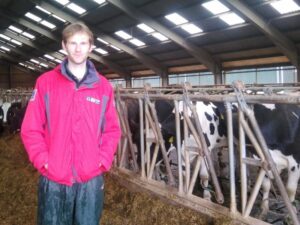The availability of seasonal labour is of huge concern to vegetable and flower farmers – particularly given Brexit – but it could be a thing of the past thanks to an innovation from Kernow Robotics.
Founded in 2019 by Ben Green, Kernow Robotics aims to ease pressures on seasonal labour by introducing self-driving mini tractors to farms.
Having gained experience of fruit picking robots when working with Fieldwork Robotics at the University of Plymouth, Mr Green saw potential to overcome the labour issue. “This pressure is unlikely to change so we started looking at using robots for tasks instead,” he says.
With Brexit restricting availability of seasonal workers from abroad, labour shortages have been an ongoing trend, explains Mr Green. “I think Cornwall got 200 workers on the new seasonal worker scheme, which is enough for one daffodil farm – nowhere near the requirements.”
However, the robot isn’t necessarily designed to replace jobs, but to supplement them. “For example, you wouldn’t pay someone to walk around a field scaring crows all day but with a mobile robot there’s no cost.”
Working with Agri-Tech Cornwall, Mr Green secured a £7,200 grant to create a self-driving agricultural robot. The first step in the design process was to create a mobile platform, known as a mini tractor. “On top of this will be tools, such as precision spraying and weeding options.”
Mr Green hopes the first prototype will be up and running by the end of April, with the machine ready to hit the commercial market in three years, priced at a likely £10,000. “We are looking to form partnerships with local producers and key parties – not necessarily to sell the product but to work together while generating some interest about what the robots can do and set about solving some of these problems.”
The mini tractor will have interchangeable tools and Mr Green plans to offer the whole service as a package, in which the farmer will contract the Kernow Robotics team to bring several of the robots to a field and oversee the process, without the farmer needing to be there or having to shell out for the robot itself.
“Practices like ploughing are energy intensive and you need a big tractor, but for precision spraying you can have a small robot driving over every row of vegetables with a camera that specifically identifies a weed and has a nozzle to spray it,” explains Mr Green.
“Chemical usage could be cut down astronomically to more sustainable levels. That’s the exciting bit for us because we’re enabling brand new schools of thought on how we can approach these barriers that have always seemed insurmountable.”
Beginning with local challenges, Kernow Robotics will focus on how the machines can help Cornish daffodil farmers before looking into options on livestock farms. “As we go forward, we will discover more uses for the machines; for livestock we have researched monitoring which could be used for calving or lambing. The robot will be able to identify when an animal is in labour and send a message to the farmer in case it needs assistance.
“I’m really focussing on local problems and helping local farmers – I hope to make a real difference to the future of Cornish farming.”





